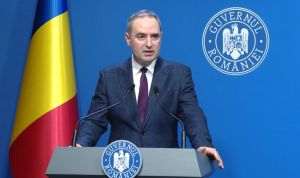Reporter: How do you view the evolution of the Romanian economy last year?
Johann Lurf: Last year was surprisingly better than forecasted. Everyone was expecting an economic growth somewhere between 0 and 1% at the end of the year, but according to our estimates, it reached approximately 2%, mostly due to the good results in agriculture. It was a surprise, but the segment of agriculture will not be enough for the future.
Reporter: What are your estimates for this year, regarding our economy? Could we reach the forecasted growth announced by the IMF, of 1.5-2%?
Johann Lurf: My expectations are rather cautious. The European economic context does not provide us with an optimistic outlook, on one hand, and on the other hand, I think that Romania still has a lot to do to return to economic growth. From my point of view, the main thing to be done would be to reduce bureaucracy, in order to stimulate economic growth. At any rate, I do not think that we will be seeing the rates of growth we had prior to 2008. An economic growth of 1.5% is possible, but we need to consider that the inflation rate will still be somewhere near 3%.
Reporter: What does the European banking system look like in the context of the Eurozone crisis?
Johann Lurf: The banking system is in a rather difficult situation. The European banking authority has asked banks to ensure a capital adequacy ratio of 9%, by creating a temporary capital buffer for the exposure to sovereign debt, just as, not long ago, banks were more or less invited to invest in government bonds of the various countries. The decision to raise the capital requirements is rather difficult to understand in the current context, when demand for loans is low.
Reporter: Where does our banking system stand in the context of the Eurozone crisis?
Johann Lurf: Romania itself is very much exposed to all the European demands, given the fact that all of the main banks in the country are subsidiaries to the European banks. It is clear that all of the requirements imposed on the parent banks will have an effect on the domestic market.
Reporter: What is the growth outlook this year, for the Romanian banking system?
Johann Lurf: I expect moderate rates of growth, on the deposits side, because I would say that the population has learned its lesson from the crisis, and is more careful in managing its savings. There is not enough money available to stimulate consumption, which means that lending will remain rather low. Until 2008, growth was a key factor for the banking system. Right now, the emphasis is more on profitability, which can be reached through more business, which leads to an increase in revenues, or through the management of costs. The banks that haven't begun to do so, will need to start cutting costs very soon.
Reporter: Does the Romanian banking system need investment banks?
Johann Lurf: From my point of view, I do not see a strong need for investment banks. The economy is not developed enough to need investment banks. The building of an investment banking structure could prove to be an investment which would not break even.
Reporter: Could we see new international players enter the banking sector this year?
Johann Lurf: I do not expect this to happen in 2012, nor in 2013. There are definitely no market conditions to buy banks in Europe. There are no strong players that are not yet present in the market, and who not wish to invest. There are banks for sale, but I do not see any buyers showing up any time soon.
Reporter: Is Volksbank Romania getting ready to find a buyer?
Johann Lurf: The sale of Volksbank Romania is not a task which you can complete in a couple of months. The process takes somewhere between three to five years, at best. The shifting of Volksbank Romania into the non-core division does not mean that business will not continue. When you want to sell something you need to have a business at your back. The shareholders have recently reaffirmed their commitment by increasing the share capital by 220 million Euros, which shows that they support Volksbank Romania and that they are ready to invest in the future of this bank.
Reporter: How did lending go last year, at Volksbank?
Johann Lurf: The common thread in 2008 was low demand. However, lending was no longer for Volksbank the priority it was in until 2008. We want to become a universal bank, for the retail and SME market. Banking means more than lending, so we are focusing on other segments.
Reporter: Which of the retail, SME and corporate segments did best last year, in Volksbank?
Johann Lurf: Higher demand, as well as the ability to satisfy that demand, came from the SMEs and the agricultural sector. For us it was a good thing to see that agriculture did well in 2011, but we shouldn't overlook the fact that agriculture depends on nature's whims and there are no guarantees. As for the currency favored by the customers, there was higher demand for loans denominated in Euros, but the leu has begun playing an increasingly important part.
Reporter: Will loans become cheaper, now that the NBR has lowered the policy rate?
Johann Lurf: I do not think that there will be significant decreases in the coming three months. There is indeed a signal in this respect from the National Bank, but on the other hand there is also pressure to do the opposite: the cost of risk remains high, for loans in lei and for loans in Euros as well, and competition between banks to raise resources has resulted in the high interest rates on deposits, which reduces chances of cheaper loans.
Reporter: Can saving still be encouraged, if the NBR cut the policy rate?
Johann Lurf: Even after the three interest rate cuts, it remains positive compared to inflation. If we look at inflation, which is around 3%, and at the interest rate on deposits, which range between 6 and 7%, even in the short term, customers can get a nice return on their deposits.
Reporter: Volksbank recently cut the interest rate on short term deposits. Did you follow the decisions of the NBR made in the last monetary policy sessions?
Johann Lurf: We followed the events of the money market, and the decisions of the NBR definitely need to be reflected by ours. There is enough market liquidity for lei in the market and it makes no sense to pay more for them.
Reporter: Will non-performing loans remain a problem for the banking system in 2012 as well?
Johann Lurf: Non-performing loans are the most important problem in the banking system. I expect that, in the first half of this year, they will peak and then start dropping slightly. This will also depend on the new business: we have loan repayments, and if the new loans do not compensate this decrease of the balance, then, percentage wise, the rate of non-performing loans will increase, even if volume has remained constant.
Reporter: What was the year 2011 like for Volksbank?
Johann Lurf: 2011 was the year of restructuring for Volksbank. We have restructured the network and we have elaborated a new regional concept - eight regions I in the rural area and two regions in Bucharest - we have cut the number of branches and shut offices where there was no opportunity to do business. We have completely revamped the portfolio and the offer of products. The offer was mostly aimed at the daily needs of the customers. We want to turn to reasonable banking, which answers to demand. It is a still ongoing process, which could not happen from one day to the next and this will take some time. As to what concerns the financial results, they will definitely not be good, but I can't give you exact numbers.
Reporter: What are your plans for this year?
Johann Lurf: We will continue with the implementation of the program which we have begun and we want to spend approximately 1 million Euros on training for our employees, with the purpose of being as flexible as possible with the needs of our customers.
We are less interested in the lending part, and on the deposits part, we are preparing new products, which will stimulate long term saving. We will also focus on the internet banking segment.
An economic growth of 1.5% is possible, but we need to take into account that inflation will still be somewhere around 3%.
•
I expect that, in the first half of this year, non-performing loans will peak and then start dropping slightly.
•
We want to spend approximately 1 million Euros on training for our employees.
•
We are less interested in the lending part, and on the deposits side we are preparing new products, which will stimulate long term saving.
•
Last year was surprisingly better than forecasted.
•
The reduction of bureaucracy is the main task, from my point of view, in order to stimulate economic growth.


























































